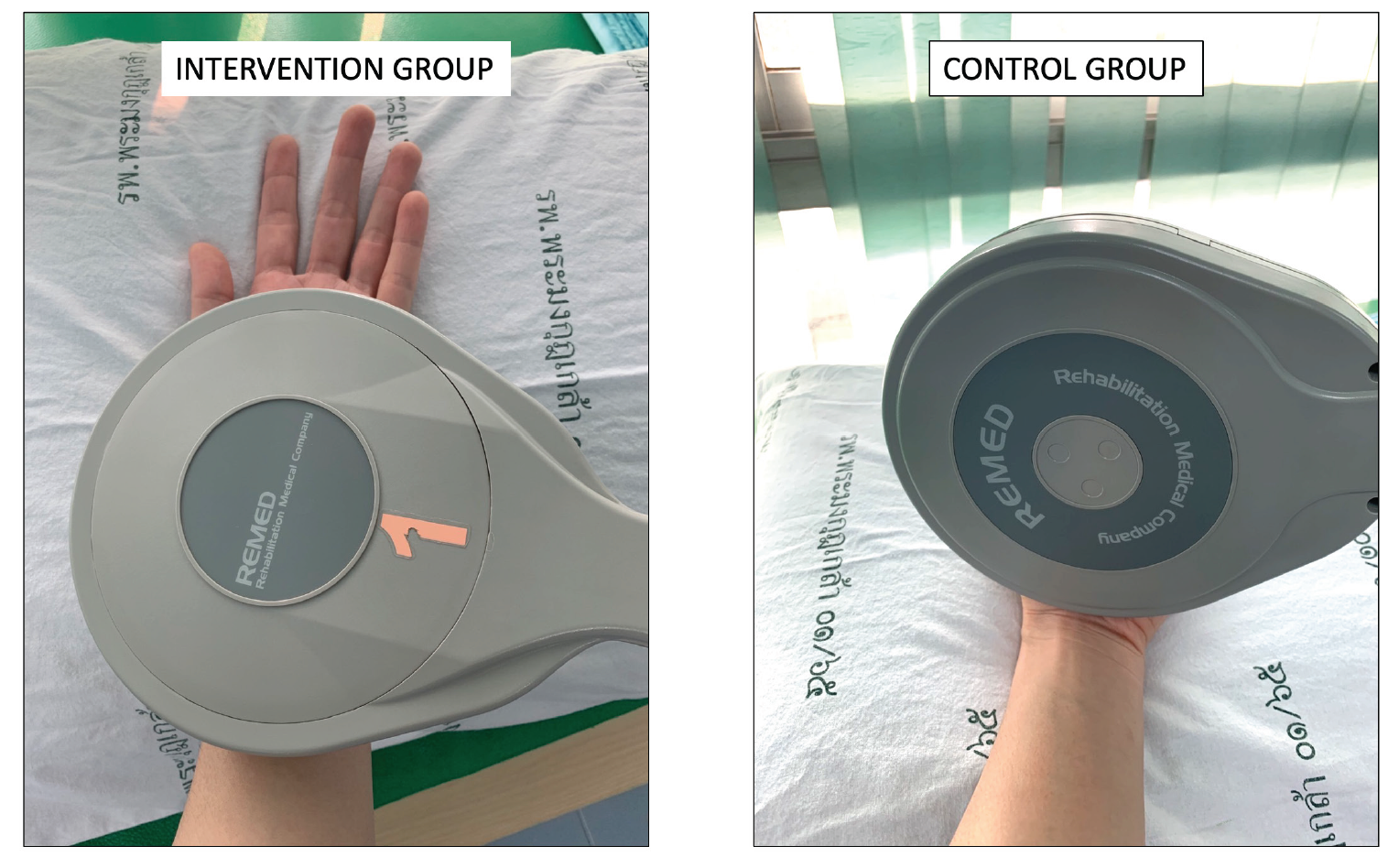Effectiveness of Repetitive Peripheral Magnetic Stimulation for Treatment of Mild to Moderate Carpal Tunnel Syndrome: A Randomized Controlled Trial
DOI:
https://doi.org/10.33192/smj.v75i7.262387Keywords:
Repetitive peripheral magnetic stimulation, carpal tunnel syndrome, median neuropathy at the wrist, non-surgical treatmentAbstract
Objective: This study aimed to evaluate the effectiveness of active repetitive peripheral magnetic stimulation (rPMS) compared to sham rPMS on symptoms severity and functional status among patients with mild to moderate carpal tunnel syndrome.
Materials and Methods: A randomized controlled trial was conducted. Participants were randomly allocated (1:1) to either intervention (active rPMS) or control (sham rPMS) groups. Both groups received rPMS (A20 mode of OPTIMUS Pro) for 10 min, once a week for four weeks (four sessions). Symptom severity scales (SSS) and functional status scales (FSS) of Boston Carpal Tunnel Questionnaire were measured at baseline (before session one) and at the end of treatment (after session four). The relative changes in SSS and FSS scores were calculated as a clinical outcome.
Results: Forty-two participants were enrolled and randomly allocated to either the intervention (n = 21) or control group (n = 21). There were no statistically significant differences in the median (interquartile range) of relative changes in SSS [0.05 (0.15) vs 0 (0.27), P = 0.41] or FSS [0 (0.25) vs 0 (0.11), P = 0.97] between the intervention and control groups.
Conclusion: Active rPMS did not improve clinical outcome compared to sham rPMS among patients with mild to moderate CTS. A greater number of subjects and treatment sessions might be required for the future study.
References
Atroshi I, Gummesson C, Johnsson R, Ornstein E, Ranstam J, Rosen I. Prevalence of carpal tunnel syndrome in a general population. JAMA. 1999;282(2):153-8.
Sucher BM, Schreiber AL. Carpal tunnel syndrome diagnosis. Phys Med Rehabil Clin N Am. 2014;25(2):229-47.
Werner RA, Andary M. Electrodiagnostic evaluation of carpal tunnel syndrome. Muscle Nerve. 2011;44(4):597-607.
Wipperman J, Goerl K. Carpal Tunnel Syndrome: Diagnosis and Management. Am Fam Physician. 2016;94(12):993-9.
Beaulieu LD, Schneider C. Repetitive peripheral magnetic stimulation to reduce pain or improve sensorimotor impairments: A literature review on parameters of application and afferents recruitment. Neurophysiol Clin. 2015;45(3):223-37.
Smania N, Corato E, Fiaschi A, Pietropoli P, Aglioti SM, Tinazzi M. Repetitive magnetic stimulation: a novel therapeutic approach for myofascial pain syndrome. J Neurol. 2005;252(3):307-14.
Renner T, Sollmann N, Heinen F, Albers L, Trepte-Freisleder F, Klose B, et al. Alleviation of migraine symptoms by application of repetitive peripheral magnetic stimulation to myofascial trigger points of neck and shoulder muscles - A randomized trial. Sci Rep. 2020;10(1):5954.
Khedr EM, Ahmed MA, Alkady EA, Mostafa MG, Said HG. Therapeutic effects of peripheral magnetic stimulation on traumatic brachial plexopathy: clinical and neurophysiological study. Neurophysiol Clin. 2012;42(3):111-8.
Jung JS, Ha HG, Kim KS, Chae SY, Jo JY, Kim SJ. Therapeutic Effect of Transcutaneous Magnetic Stimulation and Transcutaneous Electrical Stimulation on Carpal Tunnel Syndrome - A Preliminary Study -. Clinical pain. 2016;15(01):29-34.
Sanansilp V, Euasobhon P, Than QV, Rushatamukayanunt P, Jirachaipitak S, Eiamtanasate S. Effectiveness of the Four-Frequency Protocol of Repetitive Peripheral Magnetic Stimulation (rPMS) for Chronic Pain. Siriraj Med J. 2022;74(8):518-29.
Upatham S, Kumnerddee W. Reliability of Thai version Boston questionnaire. J Med Assoc Thai. 2008;91(8):1250-6.
De Kleermaeker F, Boogaarts HD, Meulstee J, Verhagen WIM. Minimal clinically important difference for the Boston Carpal Tunnel Questionnaire: new insights and review of literature. J Hand Surg Eur Vol. 2019;44(3):283-9.
Amassian VE, Maccabee PJ, Cracco RQ. Focal stimulation of human peripheral nerve with the magnetic coil: a comparison with electrical stimulation. Exp Neurol. 1989;103(3):282-9.
Alfonso C, Jann S, Massa R, Torreggiani A. Diagnosis, treatment and follow-up of the carpal tunnel syndrome: a review. Neurol Sci. 2010;31(3):243-52.
Maccabee PJ, Amassian VE, Cracco RQ, Cadwell JA. An analysis of peripheral motor nerve stimulation in humans using the magnetic coil. Electroencephalogr Clin Neurophysiol. 1988;70(6):524-33.
Lo YL, Fook-Chong S, Huerto AP, George JM. A randomized, placebo-controlled trial of repetitive spinal magnetic stimulation in lumbosacral spondylotic pain. Pain Med. 2011;12(7):1041-5.
Lim YH, Song JM, Choi EH, Lee JW. Effects of Repetitive Peripheral Magnetic Stimulation on Patients With Acute Low Back Pain: A Pilot Study. Ann Rehabil Med. 2018;42(2):229-38.

Published
How to Cite
Issue
Section
Categories
License
Copyright (c) 2023 Siriraj Medical Journal

This work is licensed under a Creative Commons Attribution-NonCommercial-NoDerivatives 4.0 International License.
Authors who publish with this journal agree to the following conditions:
Copyright Transfer
In submitting a manuscript, the authors acknowledge that the work will become the copyrighted property of Siriraj Medical Journal upon publication.
License
Articles are licensed under a Creative Commons Attribution-NonCommercial-NoDerivatives 4.0 International License (CC BY-NC-ND 4.0). This license allows for the sharing of the work for non-commercial purposes with proper attribution to the authors and the journal. However, it does not permit modifications or the creation of derivative works.
Sharing and Access
Authors are encouraged to share their article on their personal or institutional websites and through other non-commercial platforms. Doing so can increase readership and citations.














